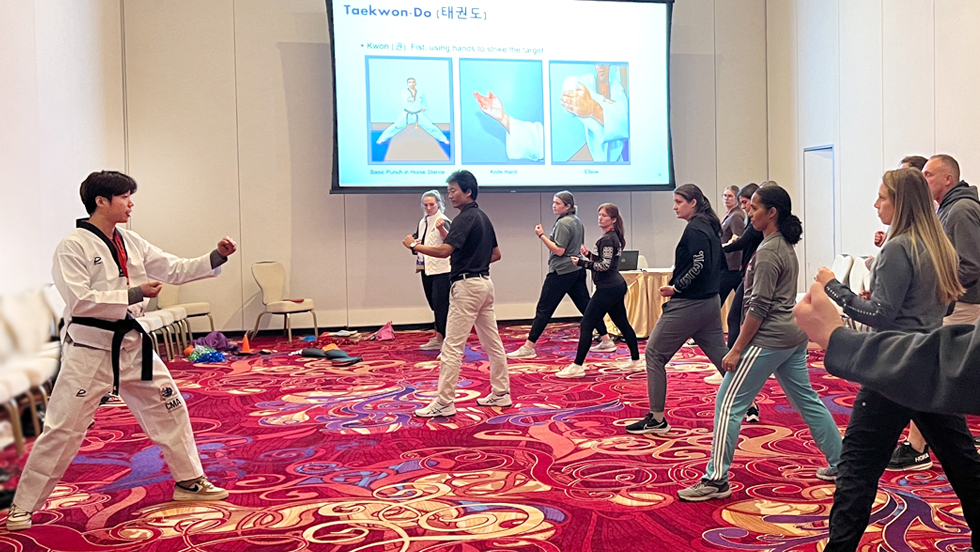
Assistant Professor Won Seok Chey, PhD, uses traditional Korean games—from gonggi to tae kwon do—to support culturally responsive teaching and learning.
From catchy K-pop tunes and the Oscar-winning film Parasite, to hit TV shows like Squid Game and Beef and martial arts like tae kwon do, Korean popular culture has taken this country by storm.
Won Seok Chey, PhD, who joined the Ruth S. Ammon College of Education and Health Sciences as an assistant professor of physical education (PE) this past fall, draws on his Korean heritage to demonstrate culturally responsive teaching.
In November, three Korean games—gonggi, jegi chagi, and tae kwon do—were central to his presentation “Learning Culturally Responsive Activities Through Korean Traditional Games,” at a New York State Association for Health, Physical Education, Recreation and Dance (NYS AHPERD) conference in Verona, New York.
“I think being culturally responsive in teaching has become essential, since the paradigm has shifted from being teacher-centered to student-centered,” Dr. Chey explained. “Students show greater interest and often learn more readily when content is more personally meaningful.”
An Introduction to Culturally Responsive Teaching
Dr. Chey’s hourlong presentation to elementary and secondary school physical education teachers covered gonggi, a popular children’s game involving competitive rounds of tossing and catching small stones or pebbles; jegi chagi, a Korean game similar to hacky sack; and a half-hour tae kwon do martial arts demonstration.
While Dr. Chey physically demonstrated tae kwon do during his presentation, his focus was on the bigger picture: the context and meaning of the martial art. “Tae kwon do is made up of three separate Korean characters and embodies each of their meanings,” he explained.
“Tae means ‘foot,’ which is used to strike targets. Kwon means ‘fist,’ which is also used to strike a target. Do means ‘discipline’ or ‘art.’”
For Dr. Chey, gaining a fuller understanding of the discipline and art of tae kwon do, with its insistence on respecting elders and peers and of communicating with others, is of critical importance for teachers.
More Than Physical Education
According to Dr. Chey, there’s more to teaching a sport or activity than simply demonstrating physical skills. His emphasis is on reminding preservice teachers that it is just as important to explain the meaning behind a sport or activity—from history, safety rules and etiquette to tactics and movements, from knowing how to construct multiple tasks starting from simple to complex, and knowing how to explain or demonstrate skills and tasks considering the context (i.e., grade-level, gender, ethnicity), to knowing how to detect and correct student errors. Without this deeper understanding, teachers who focus on how to perform a sport or activity—whether soccer or tae kwon do—will be less effective teachers.
With the support of physical education colleagues Assistant Professor Christopher Mellor, PhD, and Professors Paul Rukavina, PhD, and Kevin Mercier, EdD, Dr. Chey is preparing future teachers with a more complete and contextual knowledge of physical activities.
In his first semester as an Adelphi physical education professor this fall, Dr. Chey’s graduate course in Curriculum and Methods in Physical Education focused on the pedagogical aspects of teaching PE.
This semester, Dr. Chey is teaching Technology in Health and Physical Education, which will cover technologies—from apps and videos to Excel data analysis—used by physical education teachers to assess and improve student performance.
Meeting Student Needs
“I always tell my students that they need to know content to meet students’ different needs,” he stated. “I always try to be a mentor for my students and to communicate and be flexible. Even if a student is absent, I try to find out what was going on.”
This philosophy informed his experience as a mentor as a doctoral student teaching assistant at Ohio State University before he joined the Adelphi faculty and will continue to shape his mentoring of Adelphi’s future physical education teachers.
It’s also an outlook that defines his goal as a professor. “I want to help students go out and teach physical education better.”